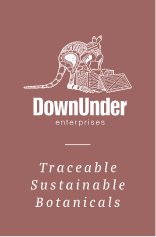Down Under Enterprises grows, produces, exports, and markets traceable
and sustainable native Australian essential oils and botanicals grown on our farm, Buhlambar, and from small growers across Australia producing unique essential oils and botanicals from plants native to Australia.
G’day mate,
It's winter here in the Southern Hemisphere. The days are cooler, and the morning dew settles on our Tea Trees yet to be harvested. Sunny days, cool evenings –and beautiful, blue sky days. Farming conditions are favorable, and the harvest of our Tea Tree crop continues.
This month we report on the impact of COVID-19 on the global logistics/shipping industry and what this has meant for our business and assuring continued supplies to you. Also, this month Down Under Enterprises, will be speaking at the Sustainable Cosmetics Summit on the benefits and options for achieving Supply Chain Traceability.
Our featured product this month is Buddha Wood Oil, also known as Desert Rose Oil. This exotic little gem of an essential oil is native to the Australian Outback. It captures the essence of ‘A-beauty’ with its solid multifunctional credentials. With a woody-rose aroma and skin soothing capabilities, Buddha Wood Oil is a great option for unisex formulations.
Thanks for reading.
Sincerely,

Phil Prather
IN THE NEWS
COVID-related shipping delays – where are we at?

The global disruptions caused by COVID-19 continues with many repercussions on trade. The shipping industry certainly isn’t exempt.
In Australia, the first sign of COVID-related disruptions were, of course, air freight – more on that later. Only more recently did we observe sea freight challenges – including a shipping container shortage! The number of available vessels seemed to halve almost immediately at the onset of COVID. We had more vessels leaving than returning. As businesses temporarily halted trade, shipping slowed. What used to be a weekly shipment for us to New York slowed to one per month, and the usual four shipments per month to Asia reduced to two - if we were lucky.
Simultaneous dock worker strikes in Australia presented further challenges in shipping to Sydney – but that’s another story – our predominant port is Brisbane, closer to our farms.
Meanwhile global shipping lanes were consolidated by the global shipping industry to restore profitability and maintain operations. This resulted in certain ports receiving additional traffic. This was the case in New Zealand where the increased volume was unmanageable for the port and the resulting congestion meant delayed voyages. For awhile, all Australian exports to North America travelled via New Zealand; what used to be a 5-day voyage was now taking two weeks.
The knock-on effect of the NZ congestion was felt at the Long Beach port in the US where cargo also backed up. Voyages from Australia were taking 40-50% longer in time. The increased volume of work to unload the backed-up containers resulted in dock workers leaving their jobs.
New York ports were significantly impacted by COVID lockdowns - customs clearance, unloading, moving containers, and driver availability were all taking significantly longer. The combined delays meant that a container could be held at port for up to 1 month to clear, whereas in the past it was done within a week.
Meanwhile on terra firma, truck driver pay in the US decreased by approximately 20 percent compared with 2019. Drivers began quitting in alarming rates in the Midwest and South Central US. The drivers began leaving their jobs as rail terminal congestion lowered their daily productivity and, in turn, their paychecks, according to trucking executives. The additional volume of containers led to shortage of trailer chassis which remains an issue in the US.
As mentioned earlier, air freight was the first to be affected. As countries closed borders, international passenger travel effectively stopped. What people may not realize is that most international air freight has traditionally been moved via passenger flights. Airlines were unable or unwilling to put on additional flights to only transport cargo. Supply routes changed greatly, and freight prices increased exponentially. Airlines significantly increased freight prices to compensate for lost passenger revenue. The Australian airline Qantas was not operating for several months and a significant portion of its staff was stood down/furloughed.
Our exports to Europe travel via South East Asia, and luckily those routes did not experience the same level of disruption. Europe is unfortunately still digging out (literally) of a congestion issue unrelated to COVID; from the container ship that blocked the Suez Canal - the primary trade route from the East.
The cost of shipping freight has gone up across the board. Surcharges increased across all shipping companies and much of this cost is being absorbed at our end as much as possible.
These delays and increased shipping costs are hurting many SME exporters. Down Under Enterprises has joined forces with other exporters and with the Australian Export Council to lobby the Australian government to address these issues. In particular, we want shipping lines to add back sailings for specific Australian routes which would not diminish revenue for the shipping line but dramatically improve availability and freight times. This lobby group is asking the government to look also at exports (not just imports),and examine the difference of experiences between container vs bulk haulage exporters.
We are still operating at COVID-normal capacity. This means booking a shipment has gone from taking 1 week to 3 weeks – just to secure a slot on a ship! Shipping schedules remain unreliable and can be cancelled unexpectedly.
In spite of all of this Down Under’s supply chain has remained resilient, and our logistics partners have been resourceful and supportive.
Much planning and flexibility is required in the new normal for our international shipments. Last minute shipments that were once done with ease are no longer realistic.
However, it’s not all doom and gloom. With some prudent forecasting, and effective communications on your product requirements, we will continue to provide delivery of our products to you in the same reliable manner you have come to expect of Down Under Enterprises.
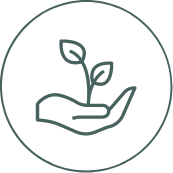
FARM UPDATES
Farming with drones
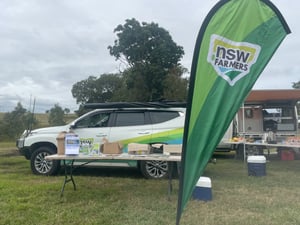
We hosted drone training at our Buhlambar Farm for local members of NSW Farmers Association.
NSW Farmers is a state-based industry group for the farming sector, championing the rights of farmers and rural communities at all levels of government and with industry stakeholders. They are apolitical, independent from government, and policy is driven from the grassroots level.
Australian farmers are turning to a drone monitoring systems to increase the likelihood of a successful crop and positively impact the consistency of supply.
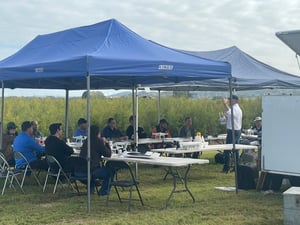
The day was educational and a great deal of fun, learning to fly drones over our Tea Tree paddocks. We commenced with a lot of classroom work, learning the regulations governing drone operations, what our legal responsibilities are as operators, and what registrations are needed to operate a commercial drone. This was followed by extensive hand-on take-offs, navigation, and landings to gain comfort with the drones.
In the afternoon, we learned to use drone technology to analyze the spectral imaging capabilities to monitor plant health and viability, long before issues become visible to the naked eye. This imaging analysis is the really exciting part of adopting drones for our farming activities.
We are implementing a “proactive farm management” approach on our farm – combining this spectral monitoring with our weather station and soil analysis probes to keep our trees happy and healthy.
Our essential oil farm is certainly moving into the 21st century.

TRACEABILITY
Sourcing Buddha Wood from Outback New South Wales
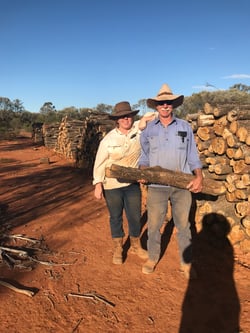
Our Buddha Wood harvesters, Di and Andy source this native botanical from land in the central Outback of New South Wales (NSW). They source Buddha Wood from farmlands in the region, which in turn provides an additional income to the families. This arrangement is particularly welcome as the drought-prone conditions of the region often impact the income generated from usual farming activities such as crop growing and live-stock rearing.
The Buddha Wood Tree (Eremophila mitchellii) is a desert-loving species, prolific to arid regions of tropical and sub- tropical Australia. It is primarily found in native scrub ranging from Northern Queensland to Northern NSW. This tree is classified as a woody weed species by our state government. This classification allows for wild harvesting of Buddha Wood in the state. Furthermore, the plant is not a viable grazing option, even for goats which are commonly used as weed control in the region.
The harvest of Buddha Wood for essential oil production targets the mature trees. This creates a regenerative process by improving the growing conditions of the younger trees coming through. Buddha Wood is a prolific grower, thus there is a bountiful amount for harvest.
As Buddha Wood is a relatively new oil introduced to the marketplace, the rate of harvest is quite minimal. Much greater harvesting capacity is possible without any issues for a sustainable and continued supply.

EMPLOYEE PROFILE
Meet our founder, Dee-Ann, a former investment banker and management consultant who started Down Under Enterprises from a spare bedroom to help her parents sell their Tea Tree Oil.
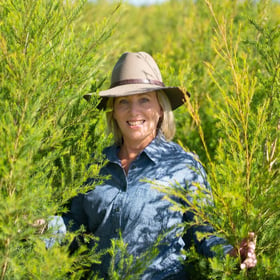
Dee-Ann is a 6th generation Australian Farmer. She founded Down Under Enterprises while living in North America over 20 years ago to help sell Tea Tree Oil from her parents’ farm. The offering was simple - 100% Pure and Natural Tea Tree Oil from her family’s farms directly to manufacturers.
Down Under acquired new customers rapidly, many requesting Dee-Ann to supply other Australian native ingredients. The product portfolio grew, and the customers grew to be the “who’s who” of the natural products industry. Nowadays, that client list includes many personal care and home care manufacturers, including multi-nationals in North America, Asia, and Europe. Purity, Traceability and Sustainability, were, and still are, core values at Down Under.
Prior to her life at Down Under Enterprises, Dee-Ann was a Management Consultant with Deloitte Consulting, based in Minneapolis, and was Vice President at Bankers Trust for four years, preceded by a five-year term at Macquarie Bank.
Dee-Ann has been recognized for her business acumen as the recipient of numerous business awards including the NSW Premier’s Award for Women in International Business, and in 2018 Down Under won the State Export Agribusiness award and was the Australian National Finalist in Agribusiness.
Dee-Ann is involved is also highly involved on an industry level. In 2017 Dee-Ann was elected as President of the Essential Oil Producers Association of Australia (EOPAA), rotating to Vice President in 2021. She is also a member of the Australian federal government’s AgriFutures Tea Tree Oil R&D Advisory Panel.

SUSTAINABILITY
Naturals – a big opportunity – even bigger risk

Down Under Enterprises’ Head of Farming Operations, Phillip Prather, will be speaking at this year’s Sustainable Cosmetics Summit on the importance of developing a Traceable Supply Chain.
From the beginning, we placed Sustainability and Traceability at the heart of our operations. More recently, we aligned our business goals with the UN Sustainable Development Goals and became a signatory to the UN Global Compact. We also became more stringent on our own supply chain, conducting in-person audits and confirming that our network of niche essential oil growers had the capability – and capacity – to support our growing customer base.
Was it worth the cost and risk? Phillip will discuss the challenges of a Naturals supply chain, what to expect as a manufacturer, and what systems are in place and evolving to facilitate this. We recognize that Traceability and Supply Chain transparency is an ongoing challenge for all of us, but critical to your brand securing trust with your consumer base.
To hear more on this topic, join us at the Sustainable Cosmetics Summit or reach out to your local Down Under Representative () who can provide more information.
SCIENTIFIC PAPER
Buddha Wood targets rash-causing microbes

Researchers at Charles Sturt University in Australia conducted testing on a large panel of Australian Essential Oils via standard disc diffusion assays at concentrations of 100%, 10%, and 1%. They found that Buddha Wood showed very promising antimicrobial action against Candida albicans and Staphylococcus aureus two microbes often implicated in skin rashes.
The yeast Candida albicans is most often the culprit in sweat rash in adults, as well as for diaper rash in infants. Shaving rash is a unisex concern which can results in folliculitis, a condition that occurs when the bacteria Staphylococcus aureus penetrates the hair follicles.
Buddha Wood demonstrated impressive antimicrobial potential against Candida at lower concentrations than any other Australian essential oil, including Tea Tree Oil and Eucalyptus Oil.
The table below shows the results of the disc diffusion assay (zones of isolation in mm) for Buddha Wood compared to Tea Tree and a Eucalyptus Essential Oil.
|
Essential Oil |
% of oil |
S. aureus |
C. albicans |
|
Eremophila mitchelli |
100% |
10.0 ± 0.0 |
16.0 ± 1.0 |
|
|
10% |
7.5 ± 0.0 |
9.0 ± 0.0 |
|
Eucalyptus staigeriana |
100% |
14.2 ± 0.6 |
- |
|
|
10% |
- |
- |
|
Melaleuca alternifolia |
100% |
11.8 ± 1.4 |
11.8 ± 1.3 |
|
|
10% |
- |
- |
FEATURED PRODUCT
Exotic Buddha Wood Oil from the Australian Outback
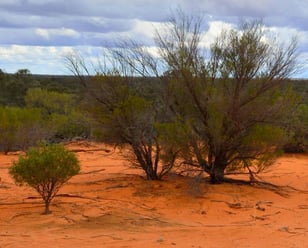
If there is one essential oil that embodies the minimal fuss Australian approach to skincare, it must be Buddha Wood Oil. Now known as “A-beauty” – this approach is typified by multifunctional, simple formulations that do a range of jobs well. The aromatic scent of Buddha Wood Oil captures the earthy essence of the Australian outback and provides a calming and grounding effect on the psyche. The earthy tones of its fragrance evoke images of a vast and rugged landscape, providing an antidote to the confines of modern living.
Buddha Wood Oil is comprised primarily of three sesquiterpene ketones: eremophilone, hydroxyl dihydro eremophilone, and hydroxyl eremophilone. Sesquiterpenes are well recognized for their anti-inflammatory properties.
This oil has great potential for applications in skincare products for its demonstrated anti-microbial and anti-inflammatory properties. Its therapeutic potential should be considered for products that cater for skin issues such as shaving rash (folliculitis), sweat rash (Candida intertrigo) and diaper rash.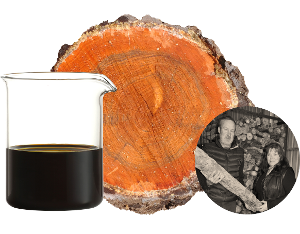
Buddha Wood Oil has a dry, woody aroma, yet carries a sweet rosy undernote. It diffuses with a smoky hue and gradually transitions into an earthy back note. It demonstrates perfect harmony between dry, smoky, and earthy notes.
The ethical supply chain of Buddha Wood, certified by government harvesting regulations, means it is not at risk of overharvesting. Buddha Wood provides a sustainable and affordable base note, a viable alternative to Sandalwood Oil, and an excellent ‘extender’ for fragrance profiles with Oud (Agarwood).
BENEFIT 1 – Soothes skin and has a unique woody aroma
BENEFIT 2 – Base note and Oud extender capabilities
BENEFIT 3 – Abundant and Sustainable Supply from Down Under Enterprises
BENEFIT 4 –Sandalwood alternative with a reliable and sustainable supply
